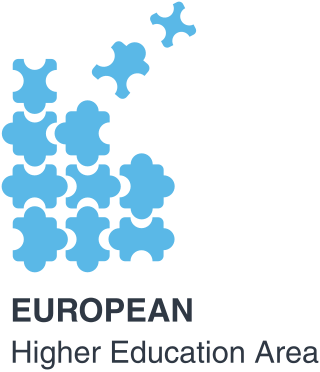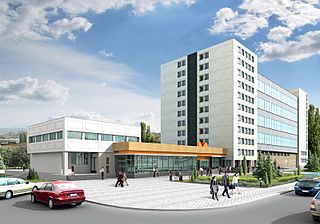Related Research Articles
An academic degree is a qualification awarded to a student upon successful completion of a course of study in higher education, usually at a college or university. These institutions often offer degrees at various levels, usually divided into undergraduate and postgraduate degrees. The most common undergraduate degree is the bachelor's degree, although some educational systems offer lower-level undergraduate degrees such as associate and foundation degrees. Common postgraduate degrees include engineer's degrees, master's degrees and doctorates.

A master's degree is a postgraduate academic degree awarded by universities or colleges upon completion of a course of study demonstrating mastery or a high-order overview of a specific field of study or area of professional practice. A master's degree normally requires previous study at the bachelor's level, either as a separate degree or as part of an integrated course. Within the area studied, master's graduates are expected to possess advanced knowledge of a specialized body of theoretical and applied topics; high order skills in analysis, critical evaluation, or professional application; and the ability to solve complex problems and think rigorously and independently.
Regulation and licensure in engineering is established by various jurisdictions of the world to encourage life, public welfare, safety, well-being, then environment and other interests of the general public and to define the licensure process through which an engineer becomes licensed to practice engineering and to provide professional services and products to the public.

The Bologna Process is a series of ministerial meetings and agreements between European countries to ensure comparability in the standards and quality of higher-education qualifications. The process has created the European Higher Education Area under the Lisbon Recognition Convention. It is named after the University of Bologna, where the Bologna declaration was signed by education ministers from 29 European countries in 1999. The process was opened to other countries in the European Cultural Convention of the Council of Europe, and government meetings have been held in Prague (2001), Berlin (2003), Bergen (2005), London (2007), Leuven (2009), Budapest-Vienna (2010), Bucharest (2012), Yerevan (2015), Paris (2018), and Rome (2020).
European Engineer is an international professional qualification and title for highly qualified engineers used in over 32 European countries. Contemporary EUR ING engineers are degree-qualified and have gained the highest level of professional competencies through training and monitored professional practice experience. EUR ING engineers are characterised by their ability to develop appropriate solutions to engineering problems, using new or existing technologies, through innovation, research, creativity and change. They might develop and apply new technologies, promote advanced designs and design methods, introduce new and more efficient production techniques, marketing and construction concepts, pioneer new engineering services and management methods.

The European Higher Education Area (EHEA) was launched in March 2010, during the Budapest-Vienna Ministerial Conference, on the occasion of the 10th anniversary of the Bologna Process.
An engineer's degree is an advanced academic degree in engineering which is conferred in Europe, some countries of Latin America, North Africa and a few institutions in the United States. The degree may require a thesis but always requires a non-abstract project.

Polytechnic of Porto - School of Engineering (ISEP) is a public polytechnic higher learning and research engineering institute, located in the city of Porto, Portugal. ISEP is divided in 8 departments, with an emphasis on applied science and technology.

Engineering education is the activity of teaching knowledge and principles to the professional practice of engineering. It includes an initial education, and any advanced education and specializations that follow. Engineering education is typically accompanied by additional postgraduate examinations and supervised training as the requirements for a professional engineering license. The length of education, and training to qualify as a basic professional engineer, is typically five years, with 15–20 years for an engineer who takes responsibility for major projects.

The European School of Economics (ESE) is a private college of higher education. It is accredited by ASIC, validated by Richmond, The American International University in London, and is an officially approved Learning Provider. ESE offers UK bachelor's degree, master's degree, MBA, and specialised short programmes at its centres in London, Rome, Milan, Florence, and Madrid.
Master's degrees in Europe are the second cycle of the Bologna process, following on from undergraduate bachelor's degrees and preceding third cycle doctorates. Master's degrees typically take two years to complete, although the number of years varies between countries, and correspond to 60 – 120 ECTS credits. Within the European Higher Education Area, representing almost all countries in Europe, master's degrees are referenced to the Framework of Qualifications for the European Higher Education Area and national qualifications frameworks.

Gembloux Agro-Bio Tech (GxABT), located in Gembloux, Belgium, is one of the eleven faculties of the University of Liège. Founded in 1860 and previously known as the Faculté universitaire des sciences agronomiques de Gembloux, it is Belgium's oldest educational and research institution dedicated to agronomic sciences and biological engineering. It is the only school in Belgium to be accredited by the French Commission des Titres d'Ingénieur allowing the university to deliver the Diplôme d'Ingénieur engineering degree. The school is also accredited by the EUR-ACE label, the highest European quality label for engineering degree programmes at Bachelor and Master level.
The European Society for Engineering Education an organisation for engineering education in Europe. Commonly known as SEFI, an acronym for its French name, Société Européenne pour la Formation des Ingénieurs, it is also known in German as the Europäische Gesellschaft für Ingenieur-Ausbildung. SEFI was founded in Brussels in 1973 and has more than 300 members in 40 countries. It promotes information exchange about current developments in the field of engineering education, between teachers, researchers and students in the various European countries.
The Chemistry Quality Eurolabels or European Quality Labels in Chemistry is a marketing scheme for chemistry degrees at institutions located within the 45 countries involved in the Bologna process. Labels are awarded to qualifying institutions under the names are Eurobachelor and Euromaster, as well as the proposed Eurodoctorate. Label Committee not only prepares for the ECTN Administrative Council proposals to award the Eurolabels but also judge the quality of chemical education programmes at HEIs. ECTN and its Label Committee closely collaborates with EuCheMS and American Chemical Society.
EQANIE is a non-profit association seeking to enhance evaluation and quality assurance of informatics study programmes and education in Europe. It was founded on January 9, 2009 in Düsseldorf, Germany. EQANIE develops criteria and procedures for the evaluation and quality assurance in informatics study programmes and education. EQANIE awards the so-called Euro-Inf Quality Label to degree programmes that comply with the Euro-Inf Framework Standards and Accreditation Criteria. As of 2021, informatics study programmes from 21 different countries have been accredited.
Higher education accreditation is a type of quality assurance process under which services and operations of post-secondary educational institutions or programs are evaluated to determine if applicable standards are met. If standards are met, accredited status is granted by the agency.
Commission des Titres d'Ingénieur is the main committee responsible for evaluation and accreditation of higher education institutions for the training of professional engineers in France. It regulates the issuance of the Diplôme d'ingénieur and use of the academic title of "Ingénieur Diplomé".
The European Network for Accreditation of Engineering Education (ENAEE) was established in 2006 as an organization to promote quality in engineering education across Europe and beyond. It is rooted in the Bologna process which aims to build the European Higher Education Area.
Membership of ENAEE is open to all bodies concerned with educational and professional standards in engineering. Such bodies may include accreditation and quality assurance agencies, professional organisations, associations of higher education institutions, employers' associations, and engineering student bodies and their associations.

The European Polytechnical University, or EPU, is a private engineering university, located in Pernik, Bulgaria. The university was founded in 2010.
References
- ↑ EUR-ACE framework standards and guidelines Revised version (2015)
- ↑ The ENAEE database of EUR-ACE labelled programmes